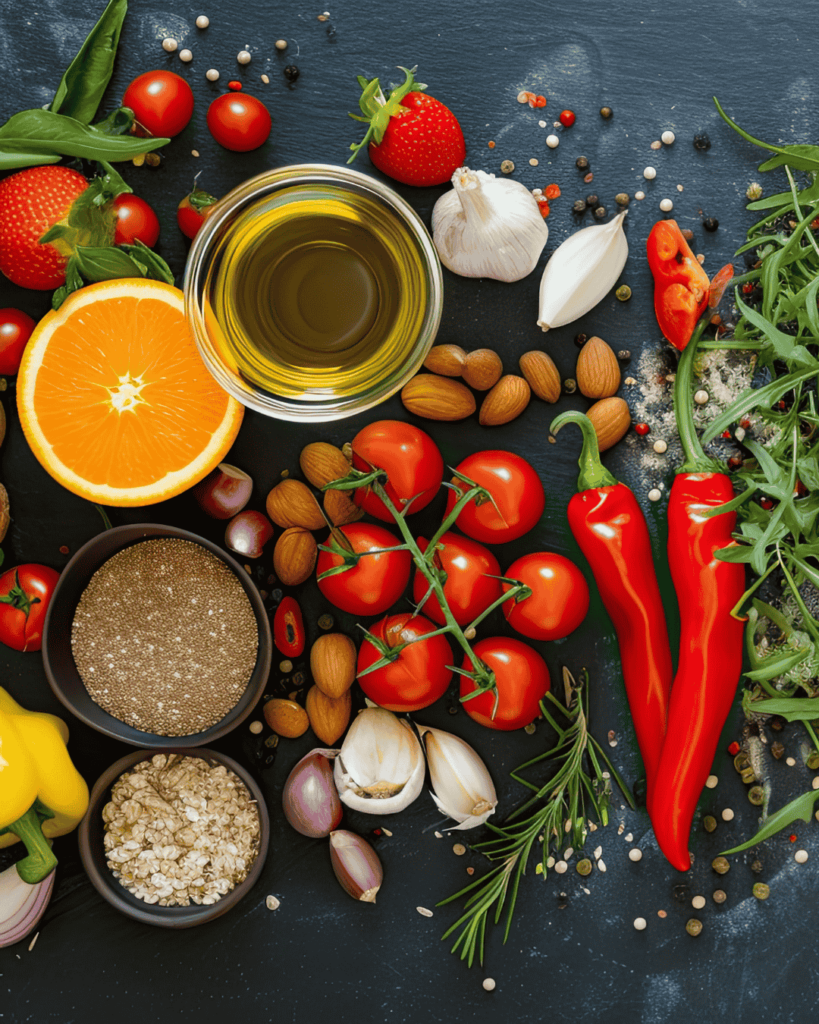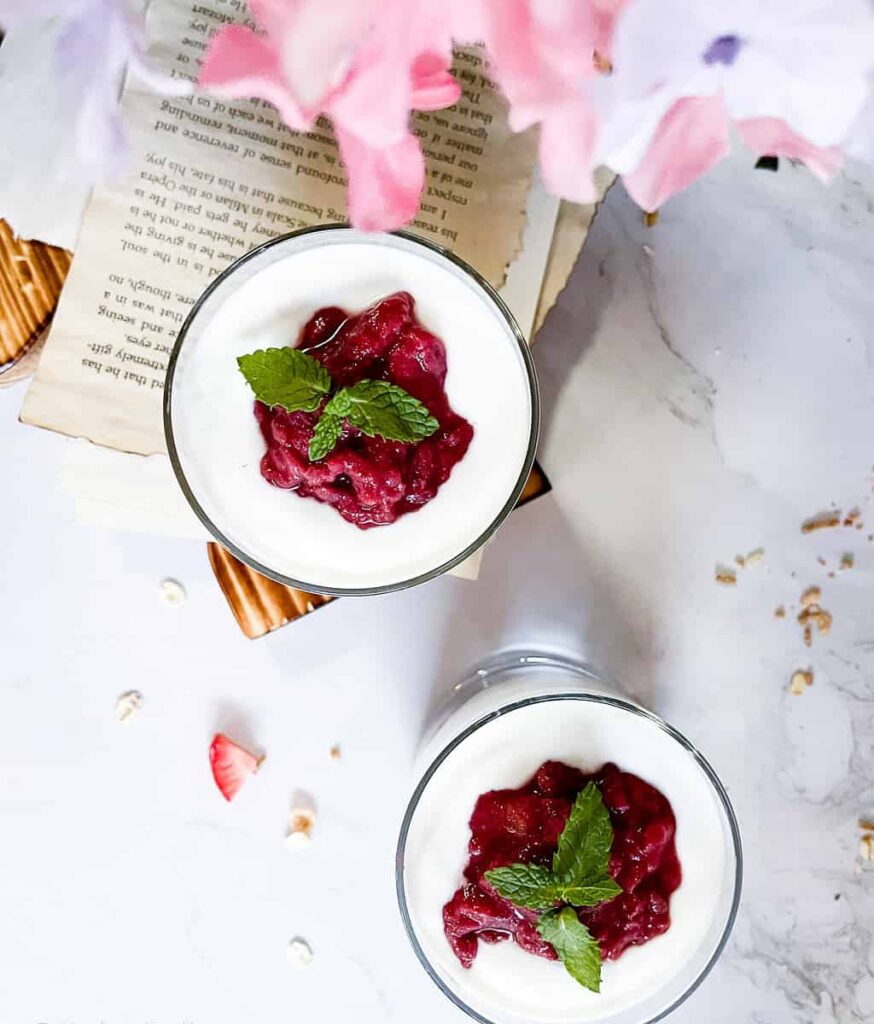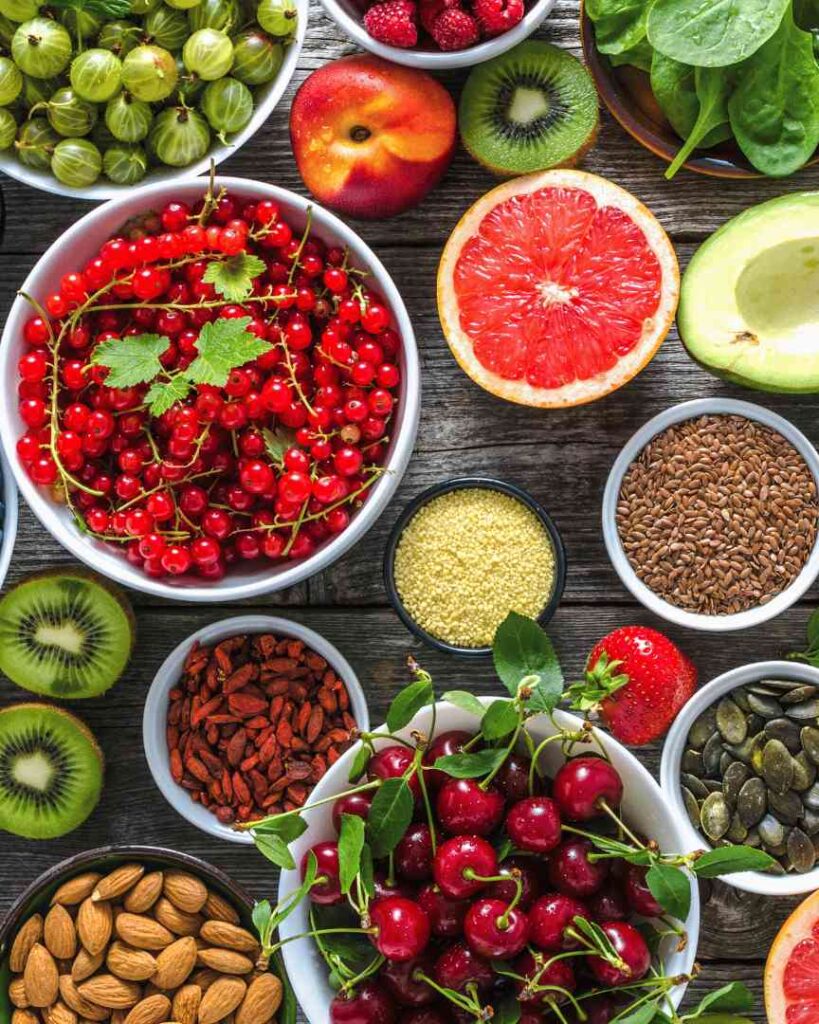Estimated reading time: 8 minutes
Picture your body as this epic machine—always hustling, whether you’re crushing a workout or just chilling with a book. Like any machine, it needs top-notch fuel to run smoothly, and that’s where essential nutrients come in. These powerhouses keep you energized, strong, and feeling like a million bucks. Let’s dive into the six nutrients for health—plus water—that make it all happen, with some tasty tips to get ‘em in your diet. Ready to fuel up?
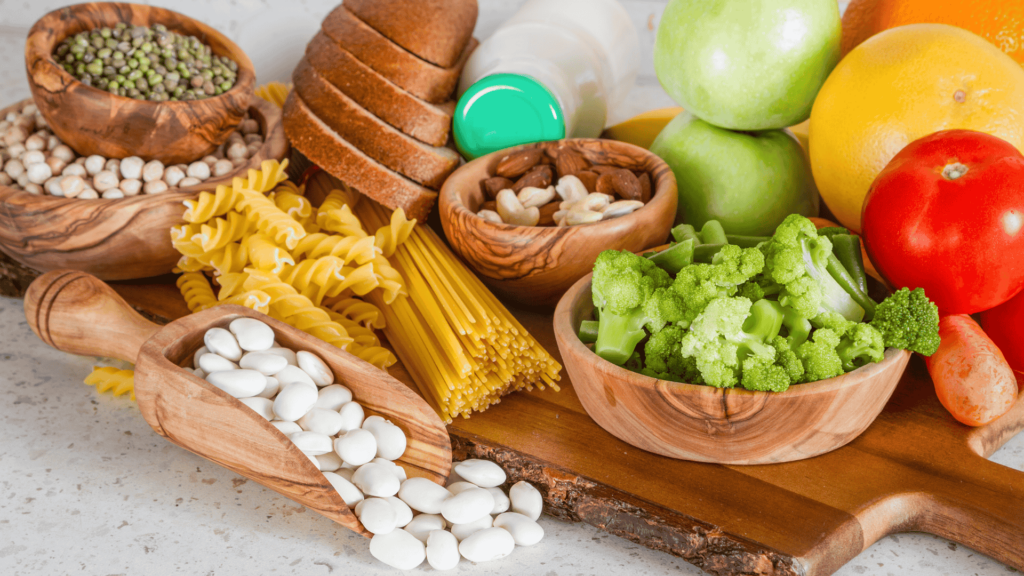
Table of contents
Carbohydrates: Your Body’s Go-To Energy
Carbs are like the gas in your tank—the body’s favorite way to keep the lights on. Found in stuff like fruits, veggies, grains, and dairy, they break down into glucose, which powers everything from your morning jog to your Netflix binge. Without carbs, you’d be dragging, big time.
Simple vs. Complex Carbs
Not all carbs are equal. Simple carbs—like candy or soda—are quick sugar hits, giving you a fast buzz that crashes just as fast. Complex carbs, like brown rice, oats, or sweet potatoes, take longer to break down, dishing out steady energy. Think of simple carbs as a sprint and complex ones as a marathon.
How Much Do You Need?
Aim for carbs to make up 45–65% of your daily calories—more if you’re an athlete burning through energy. For a 2,000-calorie diet, that’s about 225–325 grams. Skip the sugary junk and load up on whole grains, veggies, and fruits for nutrients that keep your body happy. Pro tip: a bowl of oatmeal with berries is my go-to for a carb-packed breakfast that doesn’t tank my vibe.
Protein: The Builder of You
Protein’s the construction crew for your body, building and fixing muscles, skin, hair, and even enzymes that keep things ticking. It’s a must for anyone who moves—whether you’re lifting weights or chasing kids—and it helps you stay full, which is clutch for keeping your diet on track.
Where to Get It
You’ve got options: animal sources like chicken, fish, eggs, and Greek yogurt pack a protein punch (a chicken breast has ~25 grams). Plant-based? Beans, lentils, tofu, and nuts have your back (a cup of cooked lentils is ~18 grams). Mix and match—my Chickpea Salad Sandwich from another post is a protein-packed lunch I can’t get enough of.
How Much Is Enough?
Most folks need 0.8 grams per kilogram of body weight daily—about 55 grams for a 150-pounder. Active types might bump it to 1.2–2.0 grams for muscle repair. Don’t stress the math—just aim for a protein source at every meal. I’m all about throwing some grilled fish on a salad for dinner; it’s easy and keeps the nutrients for health flowing.
Fiber: The Gut’s Best Friend
Fiber’s the unsung hero of essential nutrients, technically a carb but way more than just energy. It’s like a broom for your digestive system, keeping things moving and your gut smiling. Plus, it helps manage blood sugar and cuts risks for heart disease and some cancers—pretty sweet for something in your veggies.
Fiber-Rich Foods
Fruits (apples, berries), veggies (broccoli, carrots), whole grains (quinoa, whole wheat bread), and legumes (black beans, lentils) are fiber goldmines. Women should aim for 25 grams daily, men 38 grams. A handful of almonds or a lentil soup (like my go-to winter warmer) can hit a chunk of that easily.
Why It Matters
Beyond digestion, fiber keeps you full longer, so you’re not raiding the snack drawer. It’s also a blood sugar stabilizer, great for anyone watching diabetes risks. I love sneaking fiber into smoothies—spinach and chia seeds blend in like they’re not even there, but your body knows the score.
Healthy Fats: Not the Enemy
Fats get a bad rap, but healthy ones are essential nutrients your body craves for brain power, heart health, and soaking up vitamins like A and D. Ditch the “all fats are evil” mindset—your body needs the good stuff to thrive.
Omega-3s and Beyond
Omega-3s, found in salmon, walnuts, flaxseed, and chia, are rockstars for reducing inflammation and boosting your ticker. Other healthy fats—like monounsaturated ones in avocados and olive oil—keep cells happy. I drizzle olive oil on roasted veggies for a fat fix that tastes like heaven.
Balance Is Key
No daily fat quota, but keep saturated fats (think butter, fatty meats) low and trans fats (processed junk) at zero. Focus on whole sources—my Chili Orange Baked Salmon is a double win for omega-3s and flavor. Moderation’s the game, so you’re fueling health without overloading.
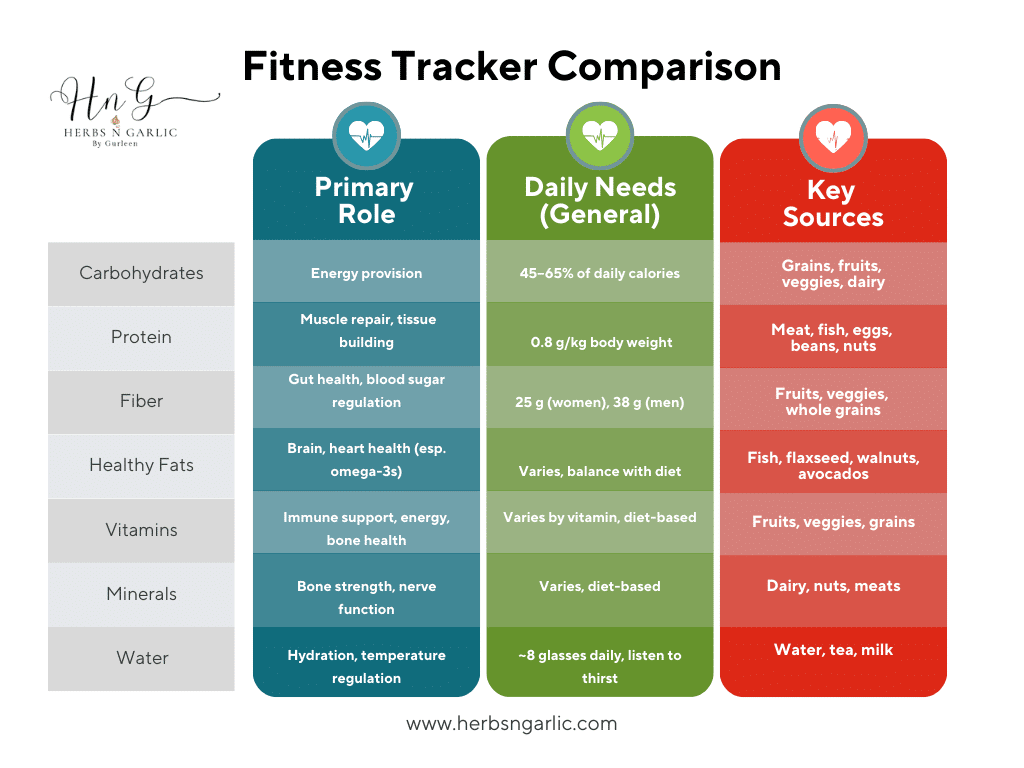
Vitamins: Tiny Heroes, Big Impact
Vitamins are like your body’s cheerleaders, working in small doses to keep everything from immunity to bones on point. Each of the 13 essential vitamins has a job—vitamin C fights colds, D strengthens bones, and B vitamins keep your energy humming.
Getting Your Fill
A rainbow plate—fruits, veggies, grains, lean proteins—usually covers it. Think oranges for C, spinach for K, or eggs for B12. I’m obsessed with a mixed berry smoothie for a vitamin blast; it’s like a party in a glass. Supplements? Only if a doc says so—too much can backfire.
Why They’re Non-Negotiable
Without vitamins, your body’s like a car missing spark plugs—sputtering along. They’re key nutrients for health, supporting everything from vision (vitamin A) to DNA repair (folate). Eat varied, and you’re likely set, but if you’re skimping on greens, time to rethink that pizza-only life.
Minerals: The Body’s Framework
Minerals are the unsung essential nutrients building your bones, nerves, and blood. From calcium for strong teeth to iron for oxygen delivery, they’re the nuts and bolts keeping your machine sturdy.
Macro vs. Trace Minerals
Macrominerals—like calcium (dairy, kale), magnesium (nuts, seeds), and potassium (bananas, potatoes)—are needed in bigger doses. Trace minerals, like iron (red meat, spinach) and zinc (oysters, beans), work in tiny amounts but pack a punch. My Grilled Paneer with Vegetables sneaks in calcium and magnesium like nobody’s business.
Why You Need Them
Calcium and phosphorus keep bones tough, while sodium and potassium balance fluids—think less bloat, better nerve zaps. Trace minerals like iodine (seafood) keep your thyroid humming. A varied diet gets you there, but if you’re low on something (say, iron for anemia), a pro can guide you.
Water: The Ultimate Essential Nutrient
Water’s not just a sidekick—it’s a star nutrient for health, making up ~60% of you. It keeps your temp steady, flushes waste, and lubes joints so you’re not creaking like an old door.
How Much to Drink?
The “eight glasses a day” rule is a decent start, but thirst, activity, and climate tweak your needs—more if you’re sweating buckets. Pale urine’s your clue you’re good. I keep a water bottle handy, but herbal tea or coconut water count too—just ease up on coffee or booze, which can dry you out.
Why It’s Everything
No water, no life—seriously. It’s in every cell, helping nutrients move and keeping you sharp. I notice a fog when I’m low, so I sip through the day. Add a lemon slice for fun—it’s a small trick that makes chugging water feel less like a chore.
Fuel Up: Your Essential Nutrients Game Plan
These six essential nutrients for health—carbs, protein, fiber, healthy fats, vitamins, minerals—plus water are your body’s dream team. Load up on whole foods: think colorful salads, grilled fish, or a lentil stew that warms your soul. Stay hydrated, and if you’ve got health quirks, chat with a dietitian or doctor—I’m no pro, but I’ve read my share of science to know this stuff’s legit. So, what’s your favorite way to pack in these nutrients? Drop it in the comments—I’m always hunting for new tricks to keep my body humming!
FAQ about Essential Nutrients
What are the 6 essential nutrients?
The six biggies are carbs, protein, fats, vitamins, minerals, and water—yep, water’s a nutrient! Check out through for the rundown. They’re the must-haves your body can’t make enough of, keeping you energized and healthy.
Why are essential nutrients important?
Essential nutrients are your body’s VIPs—without ‘em, you’re running on empty. They fuel energy (carbs), build you up (protein), and keep systems humming (vitamins, minerals). ties it all together—nutrients for health mean less fatigue, stronger bones, and a happier you!
What foods have all essential nutrients?
No single food’s a total package, but a mix like salmon (fats, protein), spinach (vitamins, minerals), and quinoa (carbs, fiber) gets close. and list faves—variety’s your ticket to covering all bases!
How do nutrients affect your health?
Nutrients for health are game-changers—carbs power you up, protein repairs, fats boost your brain, and water keeps it all flowing. Skimp, and you’re foggy or frail. and show how they keep you thriving.
What happens if you lack essential nutrients?
Miss out on these, and it’s trouble—low carbs zap energy, no protein weakens muscles, and skimpy vitamins mess with immunity. warns of brittle bones without calcium. You’ll feel it—sluggish, sickly, or worse—so don’t skip!
How much of each nutrient do I need daily?
It varies! Carbs: 45–65% of calories, protein: 0.8 g/kg body weight, water: ~8 glasses. under Carbs and under Protein break it down—tweak based on your vibe, active or chill.
Can I get nutrients for health from supplements?
Food’s best—think whole grains, fish, veggies—but supplements can help if you’re short. says check with a doc first; overdoing it’s no joke. I’d rather sip a berry smoothie than pop pills any day!
What’s the easiest way to add essential nutrients?
Load up on variety—swap white rice for quinoa, snack on nuts, sip water all day. in my protein post has sneaky tips like Greek yogurt in smoothies. Easy, tasty wins for nutrients for health!
Discover more from Herbs N Garlic
Subscribe to get the latest posts sent to your email.

